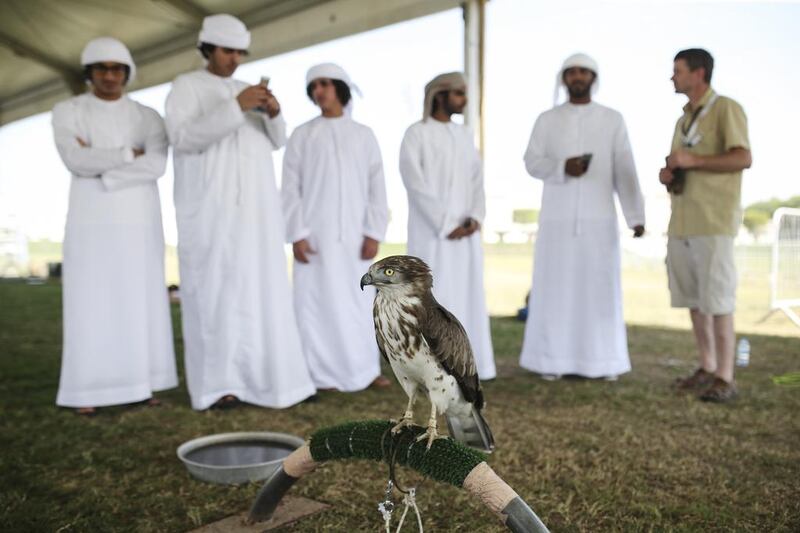ABU DHABI // Falconry, being more than just a hobby, has contributed to warm relations between the UAE and Pakistan, a leading falconer has said.
“His Highness Sheikh Mohammed bin Zayed Al Nahyan [Crown Prince of Abu Dhabi and Deputy Supreme Commander of the Armed Forces] was a great falconer and always enjoyed his falconry days in Pakistan,” said Kamran Khan Yousafzai, founder of the Pakistan Falconry Association.
“In fact, falconry has connected both the countries.”
Mr Yousafzai was speaking ahead of the third International Festival of Falconry, which ended in Abu Dhabi yesterday.
The countries’ shared love of the birds has led to numerous ventures by he UAE in Pakistan, said Mr Yousafzai, including the building of educational institutions, hospitals, roads and airports.
“These relations have led to a lot of opportunities for Pakistanis in the UAE. And, today, we have one of the largest communities based in the UAE and treat this country like a second home,” he said.
Philanthropy aside, the falconer said the UAE’s contribution to sustainable use of wildlife resources should be commended.
“As countries become increasingly urbanised, the UAE is a strong supporter of lands to be kept in their natural state, to ensure the survival of all plant and animal species.
“Sheikh Zayed once said that it is not what you catch that is important, it is what you leave behind.”
Programmes such as the International Houbara Fund for Conservation, Falcon Release Programme and an initiative to build artificial nests are some of the ways the UAE looks out for the birds, Mr Yousafzai said.
“These initiatives have not only conserved the population of wild falcons for the local falconers, but also inspired international falconers to promote sustainable hunting art in their respective countries.”
Mr Yousafzai, who belongs to a family of falconers, said that Pakistan was in urgent need of modern medical facilities for the birds.
He said that Abu Dhabi Falcon Hospital was one of the best in the world.
“We hope the UAE Government would help us train Pakistani vets as this is an urgent need,” he said.
“Pakistani falconers have no access to medical treatment for their birds and still depend on herbal solutions.”
Shahzada Mohammed Amir, another delegate from Pakistan, said the geography of Pakistan was highly favourable for falconry, stretching from Hindukush Himalayan ranges to the desert areas.
“Pakistan is long known for providing migration routes to the falconry birds. It has a very rich culture of falconry all over its map, from the flying of sparrowhawks, goshawks, shikra, red-headed merlin, peregrine, saker and many other species,” said Mr Amir, 50, who is from the Chitral area in the north-west of the country and has been a falconer since he was 10.
He said nearly 1,800 families practise falconry, and pass it on from generation to generation.
“The art has been preserved and practised as a family heritage. A falconer devotes his life to falconry, which becomes a part of his everyday life and birds are always highly valued.”
akhaishgi@thenational.ae






